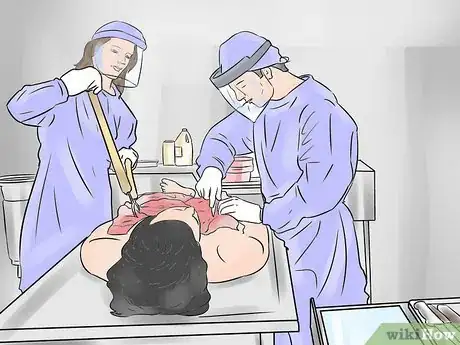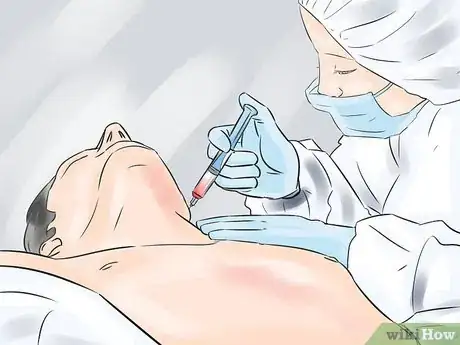wikiHow is a “wiki,” similar to Wikipedia, which means that many of our articles are co-written by multiple authors. To create this article, 18 people, some anonymous, worked to edit and improve it over time.
There are 8 references cited in this article, which can be found at the bottom of the page.
wikiHow marks an article as reader-approved once it receives enough positive feedback. In this case, 96% of readers who voted found the article helpful, earning it our reader-approved status.
This article has been viewed 172,393 times.
Learn more...
Commonly known as "death detectives," forensic pathologists are doctors who use their specialized knowledge of anatomy to determine how someone died or whether their injuries and wounds are consistent with their alleged causes of death. As coroners and medical examiners, they typically conduct autopsies, usually in a morgue or laboratory, and may also examine living patients for signs of physical or sexual abuse. If you are passionate about medicine and have an interest in investigating, you might want to become a forensic pathologist.
Steps
Completing Your Education as a Forensic Pathologist
-
1Consider if forensic pathology is the right path for you. Before you pursue a specialized education, you should research the state of the profession. There is currently a shortage of forensic pathologists both in the U.S. and in many other countries. Demand for this job is high, but the pay is also low compared to other doctors who specialize in internal medicine.[1]
- The average mid-career salary of a forensic pathologist is between $150,000 and $180,000. This pay is lower than even entry-level salaries for doctors entering into careers in hospital pathology.[2]
- You should investigate the salaries of forensic pathologists in your area -- the salaries of state-employed coroners and research assistants should be publicly available. Given the high cost of medical school, you should consider if you can pay off your student loans with this salary.
-
2Prepare for your medical career in high school. It's never too early to think about what you might want to do as a doctor. In high school, take as many courses in biology, chemistry, physics and psychology as you can. If you enjoy these courses and can do well in them, then you might pursue a pre-med program in college.Advertisement
-
3Pursue a pre-med focus in college. As you are researching colleges to attend, consider going to a school with a strong pre-med program. When you visit the college, ask members of the admissions team how many of its graduates are accepted into medical school. Although the requirements will vary between different medical schools, you should consider taking the following courses in college:
- At least one full year of biology with labs. You will probably want to take at two years (four semesters) of biology in order to be a competitive candidate for medical school.[3]
- Inorganic (general) chemistry and organic chemistry.
- Two semesters of a physics course.
- A mathematics course and a statistics course.
- English literature and composition.
- A course in behavioral sciences (such as psychology or sociology) to prepare for the Behavior section of the MCAT.
- Take electives in forensic science, criminal justice, or other forensic pathology areas.
-
4Find a supportive advisor. If your university offers a focus on forensic pathology, consider working closely with a professor who focuses in this area. They will be able to help you find internships, take the lead on research projects, and also write letters of recommendation for medical school.
-
5Gain clinical experience. You will want to show your prospective medical school that you are serious about working as a forensic pathologist. Consider finding an internship at a morgue or requesting to shadow a doctor who works as a medical examiner.
-
6Take the Medical College Admissions Test (MCAT). In your sophomore year of college, you should discuss when you should plan to take the MCAT with your advisor. Generally you should take the exam in the calendar year before you plan to go to graduate school (so if you want to begin medical school in 2017, you would take it in 2016). The MCAT is divided into four sections:
- Biological and Biochemical Foundations of Living Systems (59 questions)
- Chemical and Physical Foundations of Biological Systems (59 questions)
- Psychological, Social, and Biological Foundations of Behavior (59 questions)
- Critical Analysis and Reasoning Skills (53 questions)
- The MCAT is not something you can cram for overnight. It will require you to synthesize much of the material you have studied in your coursework. The Association of American Medical Colleges (AAMC) offers a practice on-line test, which you should use to study.
- Test prep businesses such as Kaplan also offer practice courses, but they can range between $1800-$2200.
- Many pre-med programs will also offer study courses and guides to the MCAT. You should also form a study group with your classmates and friends to help prepare for the test.
- Most test-takers who gained admission to medical school had an average score of 31.4 and a total GPA of 3.69. If your score was significantly below this, you might want to discuss with your advisor your plans for re-taking the test. Most re-takers only score between 1-3 points of their original score.[4]
-
7Go to medical school. If you are accepted into medical school, you should try to find a program that offers a forensic pathology focus. This will fall under the general umbrella of Anatomical and Clinical Pathology.
- First Year in Medical School. There is a good chance this will be your most difficult year in medical school. You will be required to take a course in gross anatomy in which you will learn anatomy on cadavers. As a forensic pathologist, you will frequently work with corpses, so if this is something you detest in medical school, you should switch specializations. You will also take courses on histology, pathology, and biochemistry.[5]
- Second Year in Medical School. Your second year will be a mix of course work and clinical experience. Here, you will learn about many diseases you will encounter in a hospital or while working in private practice. This might include things such as heart attacks, blood clots, congestive heart failure, etc.[6]
- Third Year in Medical School. This year consists of clinical rotations in which you will practice in a variety of different medical specialties, such as internal medicine and obstetrics-gynecology. You should make sure that your program will help you arrange a clinical rotation in forensic pathology.[7]
- Fourth Year in Medical School. In this year, you can spend an extended rotation in the field in which you want to specialize. This would be the year you could spend in a morgue or a county medical examiner's office. Here, you will truly get a sense of the daily life of a forensic pathologist and whether it is something you want to pursue long-term.[8]
Finding Post-Graduate Work as a Forensic Pathologist
-
1Get an internship in forensic pathology. Generally, the first position a doctor will get after graduating from medical school will be an internship. Most internships for new medical examiners will be located in morgues, the county examiner's office, or another publicly funded office. Some private hospitals also have forensic pathologists on staff.
- Use your connections from your fourth-year rotations in medical school to find a position in this kind of setting. You will need to be supervised by a trained forensic pathologist.
- Because there is such a shortage of forensic examiners, you might be faced with working very long hours and conducting hundreds of autopsies over the course of this year.
-
2Pursue a four-year residency as a forensic pathologist. Taking a residency is generally the next step for doctors after they have finished their internship.
- In your residency, you might take on slightly more complicated or advanced work than as an intern. For instance, you might be responsible for analyzing toxicology reports or for preparing paperwork that is needed over the course of a death investigation.
-
3Take a fellowship as a forensic pathologist. You will also generally need to complete a one-year fellowship at an approved medicolegal investigation facility in order to gain specialization in the field. Check with your local chapter of the American Board of Pathology to make sure the facility at which you are completing your fellowship is approved.
-
4Get certified as a forensic pathologist. After your fellowship, residency and internship, you can become board-certified as a forensic pathologist.[9]
- You will need to have completed at least 50 autopsies in order to gain certification.
- Certification will also involve taking an exam distributed by the American Board of Pathologies. It will test a combination of medical, anatomical and legal questions.Contact your local chapter of the ABP to find exam dates and further information on the test.
- You will need to renew your certification once every ten years. Certification requirements also vary by region, so if you move, you may have to get re-certified.
Advancing Your Career as a Forensic Pathologist
-
1Run for the coroner's office. In many countries, the coroner is an elected position. In this role, you might be able to propose legislation on death investigation protocol or other laws related to your field.[10]
- You will also generally have to sign off on death certificates as a coroner.
-
2Embrace advanced in technology. Forensic pathology is a constantly shifting field with advances in biotechnology. Some medical examiner offices are currently testing "virtual autopsy" technology in addition to more traditional gross autopsies. You should consider if you have an interest in technology that would advance your work.[11]
-
3Join the National Association of Medical Examiners (NAME). Because the United States currently only has half of the number of forensic pathologists that it needs, joining a professional organization is especially important. It will be helpful to exchange professional knowledge and learn the latest developments in your field.
- You should also be open to fostering new doctors and connecting with medical colleges so young med students know forensic pathology is a viable career path.
Community Q&A
-
QuestionAfter finishing my basic education, what should I study to do pathology?
 Community AnswerGo to college, then medical school, then do your Pathology residency. You may need to do a fellowship after the residency.
Community AnswerGo to college, then medical school, then do your Pathology residency. You may need to do a fellowship after the residency. -
QuestionI am in the final year of my biochemistry and microbiology degrees. I am also interested in doing forensic pathology. Can I become a forensic pathologist with these credentials?
 Community AnswerYou'll still need a degree in medicine. Otherwise though, those are two great subjects to have knowledge of going into the field.
Community AnswerYou'll still need a degree in medicine. Otherwise though, those are two great subjects to have knowledge of going into the field. -
QuestionI'm in my last year of school, but I don't know what I should do, should I do six form or should I go straight to college?
 Community AnswerGo to college. It's hard but it's worth it. Get a medical degree and focus. The more you get done early, the easier and the faster it will be.
Community AnswerGo to college. It's hard but it's worth it. Get a medical degree and focus. The more you get done early, the easier and the faster it will be.
References
- ↑ http://www.pbs.org/wgbh/pages/frontline/post-mortem/things-to-know/forensic-pathologists.html
- ↑ http://www.pbs.org/wgbh/pages/frontline/post-mortem/things-to-know/forensic-pathologists.html
- ↑ https://career.berkeley.edu/Medical/PrepPrereq
- ↑ http://www.studentdoc.com/mcat-test.html
- ↑ http://www.studentdoctor.net/2010/01/medical-school-101-what-medical-school-is-really-like/
- ↑ http://www.studentdoctor.net/2010/01/medical-school-101-what-medical-school-is-really-like/
- ↑ http://www.studentdoctor.net/2010/01/medical-school-101-what-medical-school-is-really-like/
- ↑ http://www.studentdoctor.net/2010/01/medical-school-101-what-medical-school-is-really-like/
- ↑ http://www.forensicscolleges.com/careers/forensic-pathologist
About This Article
To become a forensic pathologist, take as many science classes, like biology and chemistry, as you can while you’re still in high school to prepare for a pre-med program in college. In college, try to find a supportive forensic pathology professor who can help you find internships and write you letters of recommendation. As you enter your senior year, register to take the MCAT exam and apply for medical school. Then, get experience in the field and network by working in a morgue or shadowing a medical examiner at the local hospital. To learn how to become certified as a forensic pathologist after your residency and fellowship, read on!












































































